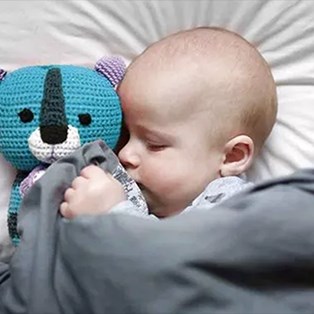Having a sleep-in better for losing weight than going to the gym, says sleep specialist.

Yes please!
Adding more sleep into your hectic lifestyle can help you lose weight and build muscle, according sleep specialist Guy Meadows.
Meadows explains that there is a link between lack of sleep and your body having a higher fat percentage.
Watch: KFC addict sheds half her body weight
Speaking to Cosmopolitan he said: “Sleeping less than 7-8 hours per night is linked to higher per cent body fat.
“Research suggests that people who average 6 hours per night are 27 per cent more likely to be overweight. Those who average 5 hours per night are 73 per cent more likely to be overweight."
Lack of sleep can cause weight gain because without adequate rest, your satiation and hunger hormones, leptin and ghrelin, will be out of kilter.
This can encourage cravings, in particular for sweet foods.

Lack of sleep can cause sweet cravings. Image: Getty.
Dr Meadows added: “"If you are serious about staying healthy and keeping fit, you are much better off making sleep a priority in your life."
Ten Tips For A Good Night's Sleep
1. Have a regular sleep pattern
Try to go to bed at around the same time every evening and get up at around the same time every morning. Improved sleep will not happen as soon as changes are made. But if good sleep habits are maintained, sleep will certainly get better. Find what time works for you and stick with it.
2. Spend the right amount of time in bed
Most adults need about 7 to 8 hours sleep every night. Some require more and some less. Many poor sleepers spend much more than 8 hours in bed and this makes fragmented sleep a habit. Except if you have lengthy sleep requirements, limit your time in bed to no more than 8.5 hours. If you often take hours to fall asleep, go to bed later. Remember that children need more sleep than adults.
3. Bed is for sleeping, not entertainment
Hand-held electronic devices (e.g., smartphones) and other distractions can interfere with your sleep. It is better not to sleep with your TV or other devices on. Your mind needs to be in the habit of knowing that if you are in bed, you are there to sleep. Don’t stay in bed if you are wide awake.
4. Wind down and relax before going to bed
Have a buffer zone before bedtime. Sort out any problems well before going to bed. This may mean
setting aside a ‘worry time’ during the day. Use this time to go over the day's activities and work out
a plan of action for the next day. Try to avoid using your computer or other electronic screens within one hour of bedtime. Exercise is fine, but not too late in the evening. Find a relaxation technique that works for you and practise it regularly, during your wind down period.
5. Make sure your bedroom is comfortable
You should have a quiet, dark room with comfortable bedding and good temperature control.

Most adults need 7-8 hours of sleep every night. Image: Getty.
6. Alcohol, caffeine and cigarettes – to be avoided
Alcohol may help you to get off to sleep, but will disrupt your sleep during the night. Caffeine (tea,
coffee, cola drinks) and the nicotine in cigarettes are stimulants that can keep you awake.
7. Avoid daytime naps
Sleeping during the day will make it much more difficult to sleep well at night. If a nap is absolutely
necessary, for example because of a late night, then limit this to about twenty minutes. Make sure
that you are awake for at least 4 hours before going back to bed. Don’t allow yourself to fall asleep in front of the TV – not even for a minute.
8. Don’t lie awake watching the clock
Watching the time on a clock just makes you anxious about not being asleep. If possible, take the
clock out of your bedroom. If you need the clock for the alarm, turn it around so that you cannot
see the time. Resist the temptation to look at the time on your various electronic devices. These should ideally be charged outside of the bedroom overnight.
9. Avoid sleeping pills except in exceptional circumstances
They do not fix the cause of your sleeping problem.
10. You may need professional help
If you are still having trouble sleeping, if you have persistent problems with mood, if you have excessive daytime sleepiness, restlessness in bed, severe snoring or wakening unrefreshed despite what should be adequate length sleep, make sure that you go and see your doctor.
For more sleep tips visit Sleep Health Foundation.

Michelle Connolly has worked as a photo director, social media manager and photo editor at some of Australia's biggest media companies, including New Idea. She is now editor of Practical Parenting and loving mum-of-two.













